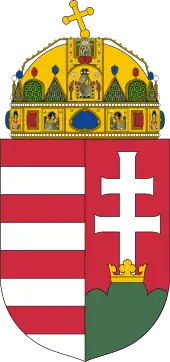| ||||||||||||||||||||||||||||||||
All 164 seats in the Diet 83 seats needed for a majority | ||||||||||||||||||||||||||||||||
This lists parties that won seats. See the complete results below.
| ||||||||||||||||||||||||||||||||
 |
|---|
Parliamentary elections were held in Hungary on 25 and 26 January 1920.[1] However, they were only held in 164 districts.[2] After the Treaty of Trianon was signed, the 44 districts previously occupied by Romania voted between 13 June and 5 July, whilst the 11 districts occupied by Serbia did not vote until 30 and 31 October 1921.[3] The election was held with compulsory voting. In protest at this and other changes to the franchise that left 60% of the voting age population unable to vote, the Hungarian Social Democratic Party boycotted the elections,[4] and called for its supporters to cast invalid votes, resulting in an unusually high number of blank or invalid votes – 12% in the January elections and over 20% in Budapest and other major cities.[1]
The National Smallholders and Agricultural Labourers Party and the Christian National Union Party between them won 194 of the 219 seats, and formed a coalition government on 15 March.[5] However, it lasted only until 4 June when the Treaty of Trianon was signed.[5]
Results
| Party | January 1920[lower-alpha 1] | June–July 1920[lower-alpha 2] | October 1921[lower-alpha 3] | Total seats | |||||||
|---|---|---|---|---|---|---|---|---|---|---|---|
| Votes | % | Seats | Votes | % | Seats | Votes | % | Seats | |||
| National Smallholders and Agricultural Labourers Party[lower-alpha 4] | 491,114 | 42.33 | 78 | 113,696 | 73.26 | 29 | 32,358 | 43.34 | 5 | 112 | |
| Christian National Union Party | 481,008 | 41.46 | 73 | 15,824 | 10.20 | 8 | 17,174 | 23.00 | 1 | 82 | |
| National Democratic Party | 68,009 | 5.86 | 6 | 6 | |||||||
| Christian Socialist Party | 25,575 | 2.20 | 3 | 3 | |||||||
| National Centre Party | 16,200 | 1.40 | 0 | 0 | |||||||
| Party of Independence and '48 | 14,928 | 1.29 | 0 | 0 | |||||||
| Hungarian Public Interest Party | 7,142 | 0.62 | 0 | 0 | |||||||
| Christian Social and Economic Party | 6,040 | 0.52 | 1 | 1 | |||||||
| Christian National Party | 4,756 | 0.41 | 0 | 1,098 | 0.71 | 2 | 507 | 0.68 | 0 | 2 | |
| Hungarian Workers' Party | 2,119 | 0.18 | 0 | 1,652 | 1.06 | 1 | 1 | ||||
| Christian National '48 Party | 1,087 | 0.09 | 0 | 0 | |||||||
| National Defence Party | 3,270 | 4.38 | 0 | 0 | |||||||
| Christian Democratic Civic Party | 2,522 | 3.38 | 0 | 0 | |||||||
| Independents | 42,119 | 3.63 | 3 | 22,931 | 14.78 | 4 | 18,829 | 25.22 | 5 | 12 | |
| Total | 1,160,097 | 100.00 | 164 | 155,201 | 100.00 | 44 | 74,660 | 100.00 | 11 | 219 | |
| Valid votes | 1,160,097 | 88.17 | 155,201 | 96.95 | 74,660 | 97.75 | |||||
| Invalid/blank votes | 155,580 | 11.83 | 4,881 | 3.05 | 1,716 | 2.25 | |||||
| Total votes | 1,315,677 | 100.00 | 160,082 | 100.00 | 76,376 | 100.00 | |||||
| Registered voters/turnout | 1,487,542 | 88.45 | 182,223 | 87.85 | 82,117 | 93.01 | |||||
| Source: Nohlen & Stöver | |||||||||||
Notes
- ↑ The number of votes for January 1920 elections is taken only from 83 of the 164 seats. In 37 of the remaining 81 seats there was only one candidate who was elected unopposed.[6]
- ↑ The number of votes is taken from only 13 of the 44 seats. In three of the remaining 31 seats there was only one candidate who was elected unopposed.[6]
- ↑ The number of votes is taken from only seven of the eleven seats. In one of the remaining four seats a candidate was elected unopposed.[6]
- ↑ The majority of candidates representing what would become the National Smallholders and Agricultural Labourers Party contested the election as Christian Smallholders or Christian National Smallholders, as the united party was not formed until January 1922.[7]
References
- 1 2 Dieter Nohlen & Phillip Stöver (2010) Elections in Europe: A data handbook, p899 ISBN 978-3-8329-5609-7
- ↑ Hubai László (2001) Magyarország XX. századi választási atlasza I., p21 ISBN 963-9082-74-0
- ↑ Nohlen & Stöver, p900
- ↑ Nohlen & Stöver, p875
- 1 2 Nohlen & Stöver, p876
- 1 2 3 Nohlen & Stöver, p915
- ↑ Nohlen & Stöver, p916